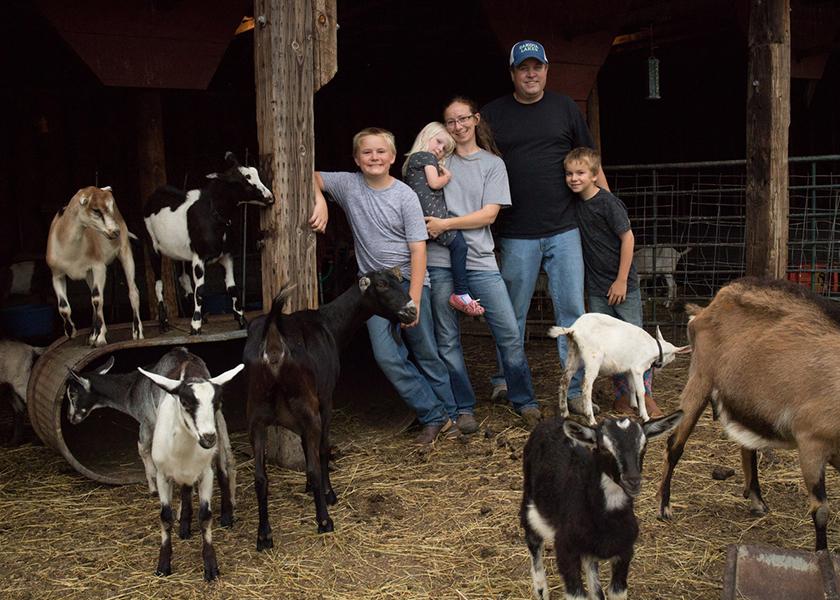Prairie Paradise Farms to Receive South Dakota Leopold Conservation Award

Prairie Paradise Farms of Fort Pierre has been selected to receive the 2021 South Dakota Leopold Conservation Award®.
In conjunction with Earth Day, Governor Kristi Noem and the South Dakota Department of Agriculture and Natural Resources announced that Prairie Paradise Farms would receive the prestigious award, given in honor of renowned conservationist, Aldo Leopold. It recognizes private landowners who inspire others with their dedication to the land, water and wildlife resources in their care.
In South Dakota, the award is presented annually by Sand County Foundation, American Farmland Trust, the South Dakota Cattlemen’s Association and the South Dakota Grassland Coalition.
Levi and Crystal Neuharth took over management of Prairie Paradise Farms from Levi’s father in 2016. Levi is a founding member and current chairman of the Soil Dakota Soil Health Coalition. The Neuharths grow a diverse rotation of crops on 2,500 acres of farmland, and rotationally graze beef cattle on 3,000 acres of grassland. The Neuharths credit regenerative agricultural practices with lessening the risks of volatile markets and weather.
The Neuharths will be presented with the $10,000 award at the South Dakota Cattlemen’s Association’s Annual Convention this fall. Award applicants were judged based on their demonstration of improved resource conditions, innovation, long-term commitment to stewardship, sustained economic viability, community and civic leadership, and multiple use benefits.
About Prairie Paradise Farms
Aldo Leopold wrote, “Prairie was, in fact, a community of wild animals and plants so organized, as to build, through the centuries, the rich soil which now feeds us.”
Levi and Crystal Neuharth connect with this quote, as they sustainably manage cropland and grassland at Prairie Paradise Farms.
The Neuharths’ land ethic stems from Levi’s father, David, a self-described “kid from the city.” David developed a love for agriculture by working on farms in his youth. After buying his own farm, he met Dr. Dwayne and Ruth Beck, who taught him the importance of soil structure and conservation practices. He soon found himself all-in on improving soil health by adopting no-till practices. He boldly sold all of his tillage equipment, invested in a no-till drill, and established crop rotations. In the years since, the Neuharths have noticed regenerative practices help lessen the risks of volatile markets and weather.
Levi and Crystal took over management of Prairie Paradise Farms in 2016. Levi is a founding member and current chairman of the South Dakota Soil Health Coalition, so they make decisions based on the five principles of soil health: 1. Keep the soil covered. 2. Disturb as little as possible. 3. Keep living roots growing as much as possible. 4. Include diversity in plant communities. 5. Integrate livestock.
The crop residue left behind from no-till practices provides a protective armor for the soil, which creates habitat for soil organisms, prevents erosion and evaporation, and keeps the soil cool on hot days. Crop rotations on 2,500 acres of farmland help break the cycle of disease, pests and weeds. A diverse rotation of crops allows them to capture different markets and spread out the risk from weather events. The Neuharths grow spring and winter wheat, milo, peas, teff, oats, millet, sunflowers, flax, garbanzo beans, lentils, corn, hay barley, as well as cover crops.
The Neuharths raise diverse livestock as well. What began as a source of milk for one of their children with allergies, is now a herd of 100 dairy goats. In addition to 4-H projects for their three children (Johnathon, Justin, and Kaydee), the goats are an important and beneficial enterprise for the farm.
Goats prefer forbs over grasses, including undesirable weeds like Canadian Thistle. When a goat eats a plant the seeds it passes through its digestive tract becomes sterile not allowing it to regrow. Their goats are grazed around water sources and weedy areas to help control pests without using chemicals. Likewise, a free-range flock of 150 laying hens help with insect control and provide an additional source of income.
Although the Neuharths have been rotationally grazing their 3,000 acres of grasslands since 2010, they do not own any cattle. Their custom grazing business provides daily monitoring and frequent rotations to fresh pastures for other people’s beef cattle.
Active in a variety of agricultural and community organizations, Prairie Paradise Farms hosts a Family Day in May where visitors partake in hands-on educational stations on topics such as livestock, insects, germinating seeds, soil layers, and grain identification.
With assistance from the USDA-NRCS and their local conservation district, the Neuharths have planted nearly 20 miles of trees to create wildlife habitat.
It's clear this is one farm that is living up to its name.
About the Leopold Conservation Award Program
The Leopold Conservation Award Program in South Dakota made possible thanks to the generous support of American Farmland Trust, South Dakota Cattlemen’s Association, South Dakota Grassland Coalition, Sand County Foundation, First Dakota National Bank, South Dakota Department of Agriculture, South Dakota Farm Bureau Federation, South Dakota Game, Fish & Parks, South Dakota State University College of Agriculture, Food and Environmental Sciences, SD DENR Discovery Center, USDA’s Natural Resources Conservation Service, Audubon Dakota, Bad River Ranches, Belle Fourche River Watershed Partnership, Blair Brothers Angus Ranch, Cammack Ranch, Daybreak Ranch, Ducks Unlimited, Kopriva Angus LLC of Raymond, South Dakota; McDonald’s, Millborn Seeds, North Central SARE-Sustainable Agriculture Research and Education, Professional Alliance, South Dakota Agricultural Land Trust, South Dakota’s Conservation Districts, South Dakota Soil Health Coalition, South Dakota Pheasants Forever, The Nature Conservancy, Todd Mortenson Family, U.S. Fish, Wildlife-Partners for Fish and Wildlife, and Wagner Land & Livestock.
Sand County Foundation and national sponsor, American Farmland Trust, present the Leopold Conservation Award to private landowners in 22 states for extraordinary achievement in voluntary conservation.
For more information on the award, visit www.leopoldconservationaward.org







